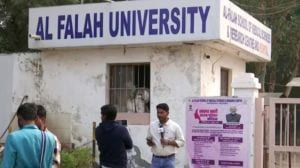Why farmers’ unions from Punjab are protesting at Delhi’s Jantar Mantar
The five unions from Punjab were an integral unit of the Sanyukt Kisan Morcha-led farm agitation against farm laws, held at the Delhi borders beginning in 2020.
 New Delhi: Farmers shout slogans during a protest at Jantar Mantar, in New Delhi, Monday, March 13, 2023. (PTI Photo)
New Delhi: Farmers shout slogans during a protest at Jantar Mantar, in New Delhi, Monday, March 13, 2023. (PTI Photo) At the start of the second part of Parliament’s budget session on March 13, five farmer unions from Punjab staged a protest against the Union government at Jantar Mantar, Delhi, over issues of CBI searches at properties of farmers’ leaders and long-standing demands on loan waivers and Minimum Support Price (MSP).
Farmers earlier took part in a procession from the Gurudwara Shri Bangla Sahib in the city while carrying flags and placards.
Under the leadership of Balbir Singh Rajewal, president of Bharti Kisan Union (BKU) Rajewal, five unions were present: the BKU Rajewal, the All India Kisan Federation, the Kisan Sangharsh Committee, Punjab, the Bharti Kisan Union Mansa, and the Azad Kisan Sangharash Committee. The Samyukta Kisan Morcha (SKM), a collective of farmers’ unions, has also planned a nationwide protest on March 20.
Were these unions part of the earlier protests at Delhi’s borders?
The five unions were an integral unit of the Sanyukt Kisan Morcha-led farm agitation against farm laws that was held at the Delhi borders beginning in 2020. Rajewal was one of the senior leaders of the agitation. However, the unions are no longer part of the SKM.
Once the three farm laws were repealed by Prime Minister Narendra Modi on November 19, 2021, farmer unions returned to their respective states on December 11, after the Union government gave a written assurance for fulfilling the rest of the demands.
Later, 22 farmer unions who were part of the SKM formed the Sanyukt Samaj Morcha (SSM) to contest the 2022 State Assembly polls. The SKM expelled all members who became part of the SSM, as contesting polls was not part of its agenda. During the poll campaign, only 17 unions were left as part of SSM. When the elections’ results came in March, all candidates except one (the gangster-turned-activist Lakha Sidana) lost their security deposits.
By July 2022, most unions came back into the SKM fold, after they said they would not engage in political activities. The remaining five unions were asked to dissolve the SSM but they refused, and are therefore not part of the SKM. But sources have said efforts are on to maintain unity among farmer unions.
Why are the farmers’ unions protesting?
At the protest, Balbir Singh Rajewal said, “Slogans were raised against the central and state governments, which have failed to address our long-standing issues. We went to Delhi to convey our anger and resentment against the Centre, which has deceived us by not fulfilling the written promises made to the farmers at the time when the three controversial central farm laws were repealed.”
In addition, they criticised the central government for the CBI searches carried out on the residences of two farmer leaders, BKU Lakhowal president Ajmer Singh Lakhowal and Indian Farmers Association president Satnam Singh Behru, on February 21. This was part of statewide searches to probe allegations of corruption against Food Corporation of India (FCI) officials, who allegedly procured inferior-quality grains to benefit merchants and rice millers in lieu of bribes.
Though the two leaders are members of the SKM, the five farmer unions said all of Punjab’s farmer unions are on the same page on the issue of CBI searches.
What happened at the protest in Delhi?
Around 5,000 farmers reached Delhi via trains on March 12. Prem Singh Bhangu, president of the All India Kisan Federation, said, “We had intimated our plan to Delhi police on March 6 by making a personal visit and there was no objection to it… Our procession was totally peaceful.” Kanwalpreet Singh Pannu, Bogh Singh Mansa and Harjinder Singh Tanda were some of the other participating union leaders.
A five-member delegation of farmers submitted a memorandum addressed to the Prime Minister. “We have also sought time from us the PM for a face-to-face meeting but we haven’t been given any time as yet. Our memorandum was taken by his office and we were told that it will be reaching him soon,” said Bhangu.
What other issues were raised?
Union presidents alleged the government was doing a “great injustice” to Punjab and farmers, pointing to issues of water disputes. They said non-riparian states like Rajasthan and Delhi were getting a major share of water resources, leaving 73 per cent of Punjab’s cultivated land unirrigated. The leaders said Punjab is facing an acute water crisis and underground water depletion. As water, irrigation and canals are state subjects under the Constitution, the centre has no right to legislate or pass any executive order on them, they said.
Issues of Minimum Support Price being made a legal right and an assured market for all crops, including vegetables and fruits, were also raised, along with demands for loan waivers for farmers and agriculture workers.
The SKM has planned a protest near parliament on March 20 on the issue of pending demands that the government agreed to at the time of the repeal of farm laws. While they have claimed a huge gathering will be held as part of a nationwide program, they have only been given permission for a protest rally at Ramleela ground and not at Jantar Mantar, as of now.



- 01
- 02
- 03
- 04
- 05



































